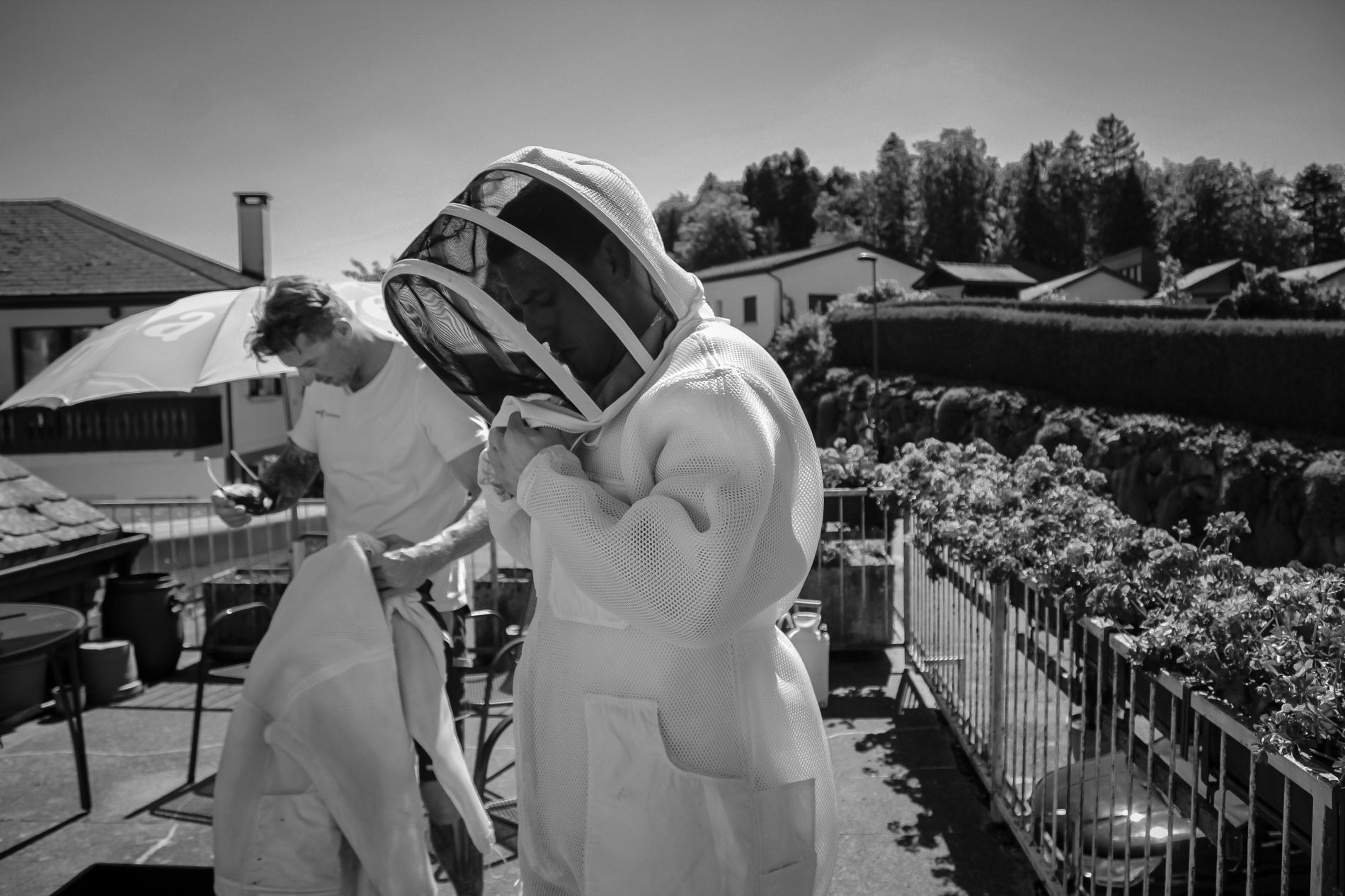
Fighting Asian hornets in Mägenwil
Have you discovered an Asian hornet's nest? We'll be on site quickly! Call now - Daily Mon-Sun 07:00-21:30. Contact us now: 058 510 22 54
Having the Asian hornet's nest removed
The hornet species Vespa velutina, hailing from South-East Asia, has aggressively spread to Switzerland and the entire subcontinent, causing distress among beekeepers as it preys on honey bees. Despite not posing a threat to humans, a small number of these hornets can rapidly attack and eliminate an entire bee colony in just a few hours. If you have discovered a hornet's nest on your house, patio, shed, or in your blind box, contact our experts for hornet nest removal in Mägenwil!
Use the uncomplicated telephone service of the Hornet experts in Mägenwil and simply inform us at 058 510 22 54, we will be on site quickly so that you and everyone in your area feel completely safe again.
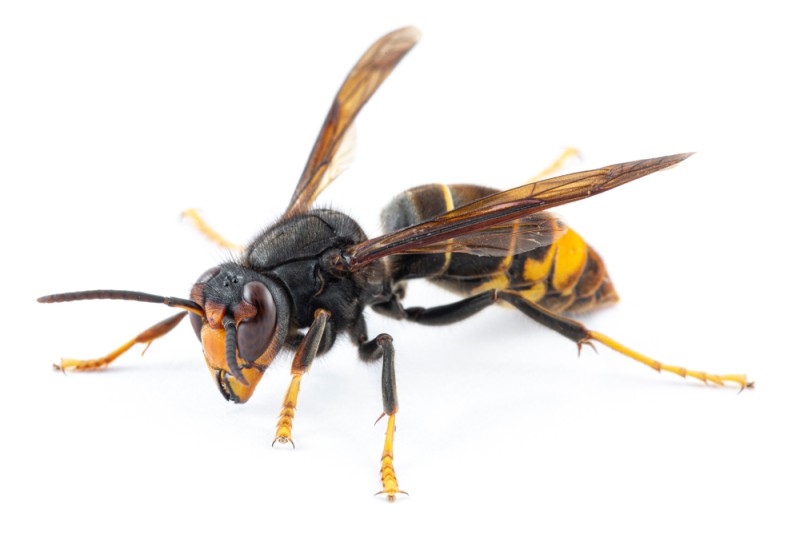

Appearance of the Asian hornet
Here are some characteristics that distinguish the Asian hornet:
1. Size: The queen can reach a length of about 3 cm, while the workers are slightly smaller and measure about 2.5 cm.
2. Color: The Asian hornet has a dark body that is almost black, with a yellow stripe at the back of the abdomen. Its face is orange-yellow.
3. Wings: The wings are dark and almost smoky gray.
4. Legs: The hornet has yellow tips on its legs, which is a striking distinguishing feature when it flies.
5. Nest: The Asian hornet's nest is often high in the trees, but it can also be found underground or in tall structures such as chimneys. It has an oval shape and is made of chewed wood, which gives the hornet a papery texture.
It is important to distinguish the Asian hornet from the European hornet (Vespa crabro), which is more harmless and a natural part of the European fauna. If you suspect you have found an Asian hornet nest near you in Mägenwil, you should report this to the local authorities, or using our reporting form, as they can spread quickly and be harmful to bees and other insects. To avoid being attacked by the flying inhabitants, you should hire a professional pest controller such as the Hornet Experts Mägenwil. We can identify the nest beyond doubt and take further steps to remove the Asian hornets professionally.
News about the Asian hornet in Mägenwil
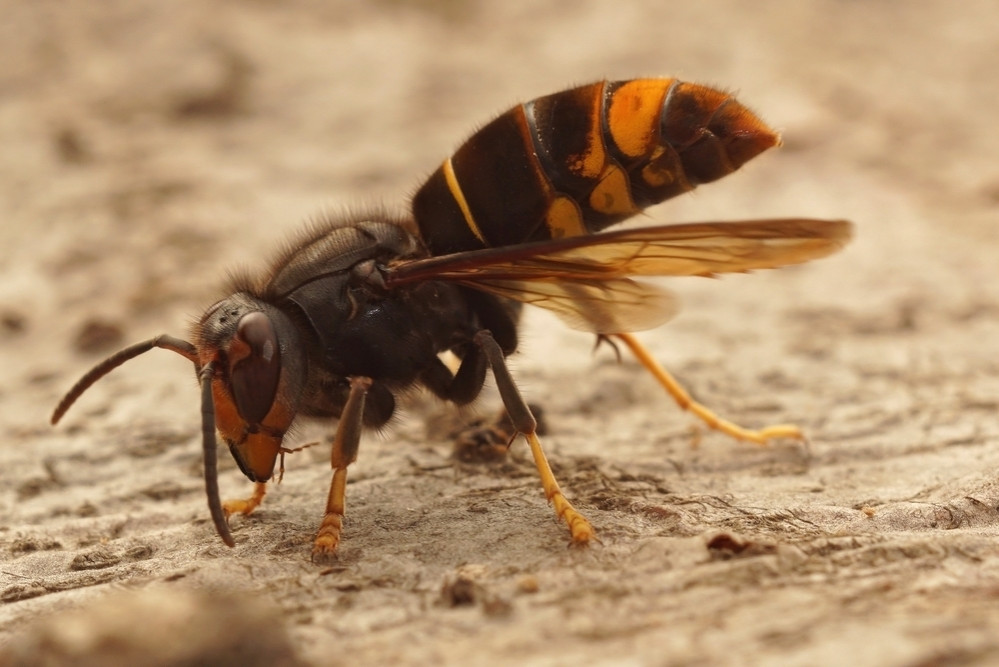
02.12.2025 Western Switzerland: Killer hornet eats bees
The territory of the Asian killer hornet has expanded considerably this year, with a notable increase reported in western Switzerland. This invasive species poses a significant threat to native bee populations, as bees make up the majority of its diet. The potential consequences are serious. Moreover, the hornet represents a danger to individuals with allergies to its venom.
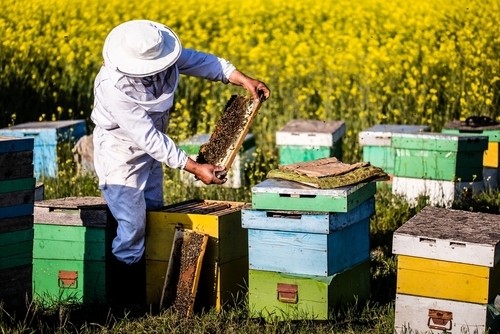
25.11.2025 Serious concerns about the bee population!
Asian hornets are inflicting significant harm on beehives across multiple parts of Europe, as reported by local beekeepers. Even a small number of hornets can destroy an entire bee colony within hours. This sharp decline in pollinators could have serious consequences for pollination, local ecosystems, and agricultural productivity.
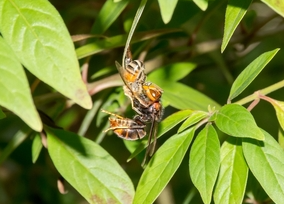
18.11.2025 Asian hornet doesn't just eat bees!
The danger it presents to insects is substantial!
The Asian hornet feeds largely on honeybees—up to 85 percent of its diet—alongside beetles and flies. This high level of predation not only poses difficulties for fruit growers but also further threatens already vulnerable bee populations.
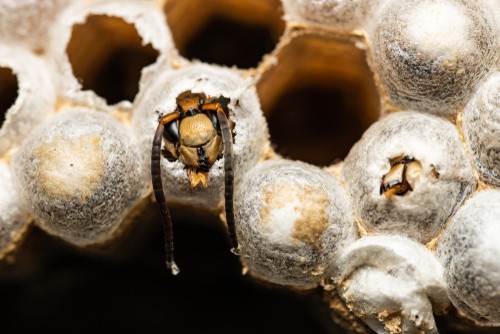
11.11.2025 How did the Asian hornet get to Europe?
The Asian hornet likely arrived in Europe unintentionally and has quickly expanded throughout France and nearby countries. Its adaptability to different environments and the absence of natural predators have contributed to its rapid spread. A single nest can generate several hundred new queens in one breeding season.
Asian Hornet Reporting Form
Please fill out all required fields and submit the form.
Help us!
If you discover an Asian hornet or a nest of this invasive species in Mägenwil, it is of the utmost importance that you report it immediately. The Asian hornet is not only dangerous to humans, but also poses a serious threat to native bee populations and the ecological balance in Switzerland.
Why is it important to report the find?
In the regions where it has established itself, the Asian hornet poses a severe threat to native insect species, especially honey bees. Through the predation of bees, this invasive hornet disrupts the delicate balance of pollinator populations, thereby affecting the local flora and agricultural productivity. By reporting sightings, experts can react quickly, remove the hornets or their nests and thus prevent the spread of this invasive species.
Notification form for sightings
The preservation of native insect populations in Switzerland depends on your support in regulating the overpopulation of the Asian hornet. Please report any suspicions or sightings using our specialized reporting form. With your collaborative efforts, we can intervene at an early stage and effectively minimize the spread of this dangerous species in our ecosystems.
Your contribution is crucial in the fight against the Asian hornet in Mägenwil. Together we can protect nature and maintain the balance of our ecosystems;
Thank you for your vigilant attention and your commitment to protecting our environment.
How dangerous is the Asian hornet?
The Asian hornet (Vespa velutina) is a predatory insect that originated in Asia and has spread in recent years to various parts of Europe, including France and now also Switzerland and in Mägenwil. Although it poses a threat to honey bees and native biodiversity, it is generally no more dangerous to humans than other wasp species. Nevertheless, there are some aspects to be aware of:
1. Threat to honey bees: The Asian hornet preys on honey bees, threatening native bee populations. A decline in bees can have a negative impact on pollination and thus on local flora and agricultural production.
2. Stings: As with other wasp and hornet species, the stings of the Asian hornet can also be painful. For most people, the stings are unpleasant but not dangerous. However, people who are allergic to wasp or hornet stings can suffer a severe allergic reaction, which in the worst case can lead to anaphylactic shock.
3. Aggressiveness: Although the Asian hornet is not necessarily more aggressive towards humans than other wasp species, it can become aggressive if it feels threatened, especially near its nest.
4. Ecological effects: Apart from the direct effects on honey bees, the spread of the Asian hornet can also disturb the ecological balance by affecting the populations of other insects.
It is crucial to note the contrast between the Asian hornet and the Asian giant hornet (*Vespa mandarinia*), which is aptly named the "killer hornet." The giant hornet's larger dimensions and more potent venom make it potentially more hazardous to humans.
If you have discovered a nest, call us immediately: 058 510 22 54
Our hornet professionals in Mägenwil are certified by the VSS.
Frequently Asked Questions About Asian Hornets in Mägenwil
The Asian hornet, often regarded as an insect of considerable peril, is especially notorious for its capability to deliver stings that can result in severe or even lethal outcomes, clearly distinguishing it as a more treacherous species when compared to the majority of other hornets.
Boasting a considerable length of about 3 cm, the Asian hornet is a large stinging insect distinguished by its slender and dark body, featuring strikingly vibrant orange, yellow, and black stripes.
Ordinarily, the Asian hornet maintains a reserved and non-confrontational nature, but when provoked or confined, it showcases remarkable energy and an aggressive stance in defense.
The Asian hornet's toxicity presents a danger to humans, as its bite is known to be painful and has the potential to elicit allergic responses.
Caution should be exercised around the Asian hornet, given the danger it presents with its poisonous sting. Its sting is notably more agonizing than those of other wasps and can lead to allergic reactions.
To appropriately report an Asian hornet, it is necessary to contact a regional officer dedicated to wild bee conservation or the relevant department within the Ministry of Agriculture.
To deter attacks and prevent the propagation of this aggressive and territorial insect, it is of utmost importance to report sightings of Asian hornets.
The presence of Asian hornets in Switzerland calls for professional hornet control. It is advisable to reach out to a pest control service for assistance.
There are no specific protections in place for the Asian hornet; however, it is imperative to maintain diligent monitoring to prevent their further dissemination.
Asian hornets, during their hibernation phase, can be found huddled together as a group or dwelling alone in the nooks of walls, buildings, garden sheds, deserted residences, or tree hollows.
Would you like more information about Asian hornets? Then take a look at our FAQ's about Asian hornets.
Private inquiry form
For an uncomplicated request to remove an Asian hornet's nest, please use our contact form for private individuals.
Real estate inquiry form
Use our property management order form to request the removal of an Asian hornet's nest.




_5.jpeg)
_5.jpeg)
_5.jpeg)
_5.jpeg)